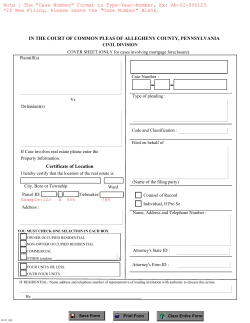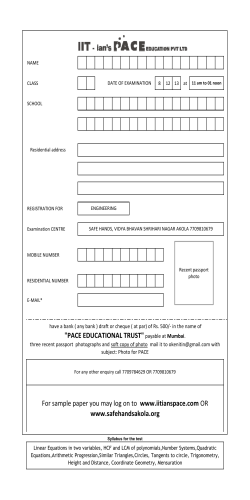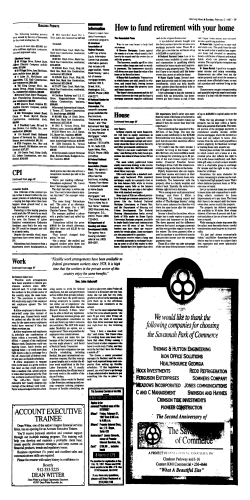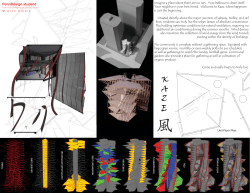
Document 313248
STATE OF CALIFORNIA - HEALTH AND HUMAN SERVICES AGENCY DEPARTMENT OF SOCIAL SERVICES EVALUATOR MANUAL TRANSMITTAL SHEET Transmittal No. Distribution: X 14APX4 All Child Care Evaluator Manual Holders All Residential Care Evaluator Manual Holders All Evaluator Manual Holders Date Issued January 2014 Subject: Appendix A – 2013 Chaptered Legislation Adult Community Care Facilities and Residential Care Facilities for the Chronically Ill. Reason for Change: This document transmits a summary of the legislation chaptered in 2013 affecting Adult Community Care Facilities and Residential Facilities for the Chronically Ill. Statutes referenced in this document are operative on January 1, 2014, unless otherwise stated. Filing Instructions: REMOVE: INSERT: 14APX1 2013 Chaptered Legislation for Adult Community Care Facilities and Residential Care Facilities for the Chronically Ill. Do not remove similar documents from the previous years. Approved: Signed by Lori Starnes __________________________________ LORI STARNES, Branch Chief Technical Assistance and Policy Branch Community Care Licensing Division Contact Person: Seton Bunker 1/8/2014 ______________________ Date Phone Number: (916) 651-3495 SUMMARY AND IMPLEMENTATION PLANS 2013 CHAPTERED LEGISLATION ADULT COMMUNITY CARE FACILITIES AND RESIDENTIAL CARE FACILITIES FOR THE CHRONICALLY ILL BILL NUMBER/AUTHOR SUBJECT PAGE ACTION REQUIRED AB 581/Ammiano Care Facilities: retaliation 1 AB 620/Buchanan Health and Care Facilities: Missing Patients and Participants 4 AB 663/Gomez Care facilities training requirements 5 AB 937/Wieckowshi Conservators and Guardians: Personal Rights Of Conservatees 6 INFORMATION ONLY – NO ACTION REQUIRED SB 82/Committee on Budget and Fiscal Review Investment in Mental Health Wellness Act of 2013 8 Unless otherwise noted, all new legislation becomes effective on January 1, 2014. When conducting licensing visits, LPAs should, to the extent practical, make sure that providers are aware of any new requirements. However, regardless of whether this information is provided, it is the licensee’s responsibility to be aware of any new requirements affecting their program. ACTION REQUIRED Assembly Bill 581 (Ammiano), Chapter 295, Statutes of 2013 Affects: Community Care Facilities (Residential Care Facility; Adult Day Programs; Foster Family Agency; Foster Family Home; Small Family Home; Social Rehabilitation Facility; Community Treatment Facility; Full-Service Adoption Agency; Noncustodial Adoption Agency; Transitional Housing Placement Facility); Residential Care Facility for Persons with Chronic Life-Threatening Illness; and Residential Care Facility for the Elderly Subject: Care facilities: retaliation Summary: Assembly Bill 581 amends Health and Safety Code section 1539 related to Community Care Facilities; Health and Safety Code section 1568.07 related to Residential Care Facility for Persons with Chronic Life-Threatening Illness; and Health and Safety Code section 1569.37 related to Residential Care Facility for the Elderly. This law expands protections for residents and employees of a licensee’s facility with regard to discrimination and retaliation. Specifically, this law: (1) expands protections against discrimination and retaliation, including eviction and the threat of eviction, for residents who have initiated or participated in the filing of a complaint, grievance or request for inspection with the California Department of Social Services the local or state ombudsman; and (2) prohibits discrimination and retaliation in any manner against residents or employees of a licensee’s facility for their involvement in the filing of a complaint, grievance or request for inspection with the California Department of Social Services or complaint investigation with the local or state ombudsman. Implementation: This law becomes effective January 1, 2014. Licensees Licensees must comply with the provisions of this law in all aspects of facility operation, including, but not limited to, facility policies, procedures and practice. If a resident or employee of a licensee’s facility initiates or participates in the filing of a complaint, grievance, or an inspection conducted by the Department of Social Services or the local or state ombudsman, this law: prohibits licensees from discriminating or retaliating against any person receiving the services of the facility in any manner. 1 prohibits licensees from discriminating or retaliating against any employee of the facility in any manner. Licensing Program Analysts Complaints Involving Residents in Care If a Licensing Program Analyst substantiates a violation of this law that involves residents in care, the Licensing Program Analyst shall cite the facility as follows: Community Care Facilities: California Code of Regulations, Title 22, Division 6 Chapter 1, Personal Rights, section 80072(a)(3); Residential Care Facilities for the Elderly: California Code of Regulations, Title 22, Division 6 Chapter 8, Personal Rights, section 87468(a)(3); and Residential Care Facilities for Persons with Chronic Life-Threatening Illness: California Code of Regulations, Title 22, Division 6, Chapter 8.5, Personal Rights, section 87872(a)(3). Complaints Involving Employees of a Facility If a Licensing Program Analyst substantiates, through existing complaint investigation processes, a violation of this law specific to an employee of a licensee’s facility, the Licensing Program Analyst shall cite the facility as follows: Community Care Facilities: Health and Safety Code section 1539 “No licensee, or officer or employee of the licensee, shall discriminate or retaliate in any manner, including, but not limited to, eviction or threat of eviction, against any person receiving the services of the licensee’s community care facility, or against any employee of the licensee’s facility, on the basis, or for the reason that, the person or employee or any other person has initiated or participated in the filing of a complaint, grievance, or a request for inspection with the department pursuant to this chapter or has initiated or participated in the filing of a complaint, grievance, or request for investigation with the appropriate local or state ombudsman.” Residential Care Facilities for the Elderly: Health and Safety Code section 1569.37. “No licensee, or officer or employee of the licensee, shall discriminate or retaliate in any manner, including, but not limited to, eviction or threat of eviction, against any person receiving the services of the licensee’s residential care facility for the elderly, or against any employee of the licensee’s facility, on the basis, or for the reason that, the person or employee or any other person has initiated or participated in the filing of a complaint, grievance, or a request for inspection with the department pursuant 2 to this chapter, or has initiated or participated in the filing of a complaint, grievance, or request for investigation with the appropriate local ombudsman, or with the state ombudsman recognized pursuant to Chapter 11 (commencing with Section 9700) of Division 8.5 of the Welfare and Institutions Code.” Residential Care Facilities for Persons with Chronic Life-Threatening Illness: Health and Safety Code section 1569.07(d) “No licensee, or officer or employee of the licensee, shall discriminate or retaliate in any manner, including, but not limited to, eviction or threat of eviction, against any person receiving the services of the licensee’s facility, or against any employee of the licensee’s facility, on the basis, or for the reason, that the person or employee or any other person has initiated or participated in the filing of a complaint, grievance, or a request for inspection with the department pursuant to this chapter or has initiated or participated in the filing of a complaint, grievance, or request for investigation with the appropriate local or state ombudsman.” The Department of Social Service’s Community Care Licensing Division procedures for responding to complaints are not impacted by this law. The Community Care Licensing Division will continue to respond to complaints within exiting statutory and regulatory authority. For legislative information related to this law, see: http://www.leginfo.ca.gov/pub/13-14/bill/asm/ab_05510600/ab_581_bill_20130909_chaptered.pdf 3 ACTION REQUIRED AB 620 (Buchanan), Chapter 674, Statutes of 2013 Affects: Adult Community Care Facilities and Residential Care Facilities for the Elderly Subject: Health and Care Facilities: Missing Patients and Participants Summary: AB 620 requires community care facilities providing adult residential care or offering adult day programs and residential care facilities for the elderly to develop and comply with an absentee notification plan for each client or resident for the purpose of addressing issues that arise when a client or resident is missing from the facility. Implementation: These statutory requirements are effective January 1, 2014, and the Community Care Licensing Division shall implement as follows: Every licensee of an Adult Residential Facility, Social Rehabilitation Facility, Adult Residential Facility for Persons with Special Health Care Needs, Adult Day Program and Residential Care Facility for the Elderly shall develop and comply with an absentee notification plan for each client or resident to address issues that arise when a client or resident is missing from the facility. For Community Care Facilities, this plan is part of the Needs and Services Plan. For Residential Care Facilities for the Elderly, this plan is part of the resident’s written record of care. The plan shall include and be limited to a requirement that the administrator of the facility, or his or her designee, inform the client’s/resident’s authorized representative, if any, when that client/resident is missing from the facility, and the circumstances in which local law enforcement must be notified. If a client/resident is missing from the facility, the administrator of the facility, or his or her designee, shall: notify the client’s/resident’s authorized representative notify local law enforcement under the circumstances specified in the absentee notification plan Enforcement Procedures: Licensees found not to have included the provisions above in the Adult Community Care Facility Needs and Service plan or the Residential Care Facility for the Elderly written record of care, or not to have complied with the required absentee notification plan, shall be cited under the following applicable statute: Community Care Facilities Act, Health and Safety Code section 1507.15. Residential Care Facilities for the Elderly Act, Health and Safety Code section 1569.317. 4 ACTION REQUIRED Assembly Bill 663 (Gomez), Chapter 675, Statutes of 2013 Affects: Adult Residential Facilities (ARF), and Residential Care Facility for the Elderly (RCFE) Subject: Care facilities training requirements Summary: AB 663 amends the existing training requirements for administrators of Adult Residential Facilities (ARF), and Residential Care Facilities for the Elderly (RCFE), in Health and Safety Code as follows: Adds an additional training element to the Uniform Core of Knowledge curriculum in the ARF and RCFE administrator certification training, to include instruction on cultural competency and sensitivity relating to, aging lesbian, gay, bisexual, and transgender community (LGBT) prior to certification (Health & Safety Code § 1562.3(c)(1)(J)). Requires the ARF and RCFE administrator to successfully complete a department-approved certification program, which includes the new training on cultural competency, sensitivity, and best practices for LGBT community, prior to certification. (Health and Safety Code § 1569.616(c)(1)(J)). AB 663 does not provide a specific number of hours necessary to complete this training. Implementation: Administrator Certification Section Program Analysts shall ensure that all approved initial certification training programs are providing this new core of knowledge training component to all prospective administrators who wish to be certified on or after January 1, 2014. Although a specific number of hours necessary for this training is not provided in statute, initial certification training vendors should be informed that the Department will be making this a one (1) hour training requirement through regulations. Regulations will be developed and applicable revisions to the Evaluator Manual will follow. 5 ACTION REQUIRED ASSEMBLY BILL 937 (Wieckowski), Chapter 127, Statutes of 2013 Affects: Adult and elderly residential care facilities; (Adult Residential Facilities, Adult Residential Facility for Persons with Special Health Care Needs, Residential Care Facilities for the Chronically Ill, Social Rehabilitation Facilities, and Residential Care Facilities for the Elderly) Subject: Conservators and Guardians: Personal Rights of Conservatees Summary: Amends Section 2351 of Chapter 1 of Division 4 of the Probate Code. Assembly Bill 937 amends the Probate Code relative to the powers and duties of a conservator. Effective January 1, 2014, the Probate Code shall be amended to state that a conservator’s authority shall not infringe on a conservatee’s personal rights, including, but not limited to, the right to receive visitors, telephone calls, and personal mail, unless specifically limited by a court order. This law only applies to full conservatorships and not to limited conservatorships. Implementation: This law becomes effective January 1, 2014. Licensees If an applicant for residency is a conservatee or if a current resident becomes a conservatee while a resident of the facility, the licensee must obtain all pertinent and official documents relative to the conservatorship. These documents are necessary for the licensee to gain knowledge of the powers and duties of the conservator and to determine if the licensee is able to meet the needs of the conservatee. In reviewing the documents relative to conservatorship, a licensee should pay special attention to the inclusion or exclusion of any orders that may impact an applicant or resident’s personal rights. In general, a licensee may not violate a conservatee resident’s personal rights, including, but not limited to, the right to receive visitors, telephone calls, and personal mail at the request of a conservator, unless specifically limited by a court order. The legal authority to restrict visitors, phone calls, and mail would have to be stated clearly in an attachment to the Letters of Conservatorship or in a subsequent order issued by the court. As this law takes a broad approach to protecting a conservatee’s personal rights, “including, but not limited to,” licensees shall ensure compliance with regulations relative to a resident’s personal rights, unless otherwise restricted in the initial Letters of Conservatorship or in a subsequent order issued by the court. 6 Licensees are encouraged to proactively work with residents who are conserved and conservators to better ensure compliance with this law. Effective January 1, 2014, licensees who are currently restricting a conserved resident’s access to visitors, phone calls and mail at the direction of a conservator must cease to do so unless the conservator can produce court documents authorizing the restriction of visitors, phone calls or mail from specified individuals or groups. Without such a court order, the licensee shall not take any action to restrict a resident’s visitors, phone calls or mail. Licensing Program Analysts Licensing Program Analysts who receive an allegation of a violation of this law, must, as part of the overall investigative process, review the resident’s file, specifically any documents relative to the resident’s conservatorship, to ascertain the authority of the conservator. Licensing Program Analysts, who substantiate a violation of this law, shall use the facility appropriate regulations related to personal rights to cite the facility. Assembly Bill 937 will not be retroactive to any complaints filed before January 1, 2014. For legislative information related to this new law: http://www.leginfo.ca.gov/pub/13-14/bill/asm/ab_09010950/ab_937_bill_20130819_chaptered.pdf 7 INFORMATION ONLY - NO ACTION REQUIRED SB 82 (Committee on Budget and Fiscal Review), Chapter 34, Statutes of 2013 Affects: Social Rehabilitation Facilities, Adult Residential Facilities and Residential Care Facilities for the Elderly Subject: Investment in Mental Health Wellness Act of 2013 Summary: Effective June 27, 2013, Senate Bill (SB) 82 established the Investment in Mental Health Wellness Act of 2013 that adds Part 3.8 (commencing with Section 5848.5) to Division 5, of the Welfare and Institutions Code. The Act relates to mental health and makes an appropriation to take effect immediately, related to the 2013 budget. SB 82 will expand access to early intervention and treatment services to improve client experience, achieve recovery and wellness, and reduce costs. The objective of this bill is to add at least 2,000 crisis residential treatment beds to facilities that provide shortterm crisis residential programs. The funding will be awarded to counties and countydesignated organizations by the California Health Facilities Financing Authority, located in the State Treasurer’s Office, for the creation of the 2,000 beds. The objective of this Act is to expand the continuum of services to address crisis intervention, crisis stabilization, and crisis residential treatment needs that are wellness, resiliency, and recovery oriented. By adding at least 2,000 crisis residential treatment beds, the Act will bolster capacity at the local level to improve access to mental health crisis services and address unmet mental health care needs. Note: Though this bill does not require any changes in the Department procedures, this bill may result in an increase in facilities that serve clients with mental illness. 8
© Copyright 2026








